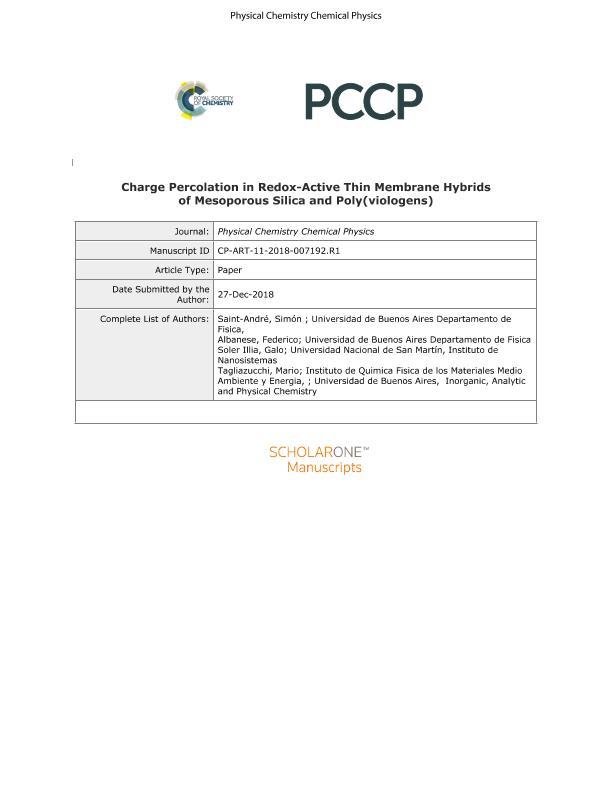Mostrar el registro sencillo del ítem
dc.contributor.author
Saint Andre, Simon

dc.contributor.author
Albanese, Federico

dc.contributor.author
Soler Illia, Galo Juan de Avila Arturo

dc.contributor.author
Tagliazucchi, Mario Eugenio

dc.date.available
2020-11-10T14:22:58Z
dc.date.issued
2019-01
dc.identifier.citation
Saint Andre, Simon; Albanese, Federico; Soler Illia, Galo Juan de Avila Arturo; Tagliazucchi, Mario Eugenio; Charge percolation in redox-active thin membrane hybrids of mesoporous silica and poly(viologens); Royal Society of Chemistry; Physical Chemistry Chemical Physics; 21; 5; 1-2019; 2743-2754
dc.identifier.issn
1463-9076
dc.identifier.uri
http://hdl.handle.net/11336/118027
dc.description.abstract
This work reports the fabrication of redox-active films of oligomeric and molecular viologens and mesoporous silica via the infiltration method. Pore-ellipsometry and UV-vis confirm that low-molecular-weight poly(viologens) in solution are able to enter the mesoporous structure, in contrast to high-molecular weight polymers that adsorb only on top of the film. Cyclic voltammetry shows that viologens are able to reach the bottom of the pores and access the electrode/film interface. However, the number of viologen sites that can be accessed by cyclic voltammetry at 50 mV s-1 is only a tenth of the total viologen population determined by UV-vis and pore-ellipsometry. The effect is ascribed to the very small apparent diffusion coefficient for charge transport within the film (Dapp < 10-12 cm2 s-1). A theoretical model is put forward to describe charge transport via the electron-hopping mechanism for redox sites randomly adsorbed on the inner walls of the pores. Our model predicts that the threshold of charge percolation occurs for viologen surface coverages close to those observed in our experiments; therefore, the low fraction of electrochemically addressable viologens is ascribed to inefficient charge percolation via the electron-hopping mechanism.
dc.format
application/pdf
dc.language.iso
eng
dc.publisher
Royal Society of Chemistry

dc.rights
info:eu-repo/semantics/openAccess
dc.rights.uri
https://creativecommons.org/licenses/by-nc-sa/2.5/ar/
dc.subject
Charge percolation
dc.subject
Nanopore
dc.subject
Redox
dc.subject
Electrochemistry
dc.subject.classification
Físico-Química, Ciencia de los Polímeros, Electroquímica

dc.subject.classification
Ciencias Químicas

dc.subject.classification
CIENCIAS NATURALES Y EXACTAS

dc.title
Charge percolation in redox-active thin membrane hybrids of mesoporous silica and poly(viologens)
dc.type
info:eu-repo/semantics/article
dc.type
info:ar-repo/semantics/artículo
dc.type
info:eu-repo/semantics/publishedVersion
dc.date.updated
2020-11-09T19:27:16Z
dc.journal.volume
21
dc.journal.number
5
dc.journal.pagination
2743-2754
dc.journal.pais
Reino Unido

dc.journal.ciudad
Cambridge
dc.description.fil
Fil: Saint Andre, Simon. Universidad de Buenos Aires. Facultad de Ciencias Exactas y Naturales. Departamento de Física; Argentina. Consejo Nacional de Investigaciones Científicas y Técnicas; Argentina
dc.description.fil
Fil: Albanese, Federico. Universidad de Buenos Aires. Facultad de Ciencias Exactas y Naturales. Departamento de Física; Argentina. Consejo Nacional de Investigaciones Científicas y Técnicas; Argentina
dc.description.fil
Fil: Soler Illia, Galo Juan de Avila Arturo. Universidad de Buenos Aires. Facultad de Ciencias Exactas y Naturales; Argentina. Universidad Nacional de San Martin. Instituto de Nanosistemas; Argentina. Consejo Nacional de Investigaciones Científicas y Técnicas; Argentina
dc.description.fil
Fil: Tagliazucchi, Mario Eugenio. Consejo Nacional de Investigaciones Científicas y Técnicas. Oficina de Coordinación Administrativa Ciudad Universitaria. Instituto de Química, Física de los Materiales, Medioambiente y Energía. Universidad de Buenos Aires. Facultad de Ciencias Exactas y Naturales. Instituto de Química, Física de los Materiales, Medioambiente y Energía; Argentina
dc.journal.title
Physical Chemistry Chemical Physics

dc.relation.alternativeid
info:eu-repo/semantics/altIdentifier/url/http://xlink.rsc.org/?DOI=C8CP07192F
dc.relation.alternativeid
info:eu-repo/semantics/altIdentifier/doi/http://dx.doi.org/10.1039/C8CP07192F
Archivos asociados
